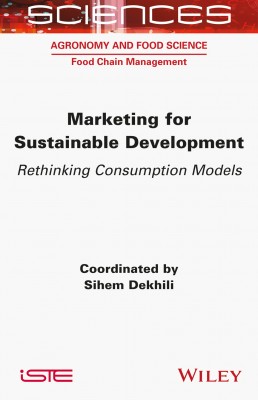
Many people see a weak association between marketing and sustainable development and even consider them as two incompatible fields. However, marketing benefits from an extremely powerful position to encourage transformations at the production level and to guide consumers towards responsible behaviors. From its inception, marketing has been positioned as a support for the relationship between the company and its customers, with the quest for well-being set in the very foundations of the discipline.
In a context that is marked by crises and much skepticism, marketing today should, more than ever, prove that it acts in good faith. This book offers practitioners, public authorities, professors and students illustrations that demonstrate that the dissemination of sustainable practices is indeed a marketing issue. It argues that it is particularly important not only to overcome the divide between the concepts of marketing and sustainability, but also to use marketing tools and frameworks to support sustainable development and strengthen the green market.
1. Opposing the Market Through Responsible Consumption to Transform It, Abdelmajid Amine and Mouna Benhallam.
2. Luxury and Sustainable Development: Companies and the Challenge of Overcoming Consumer Reluctance, Mohamed Akli Achabou and Sihem Dekhili.
3. The Fight Against Food Waste: Approaches and Limits to Consumer-based Actions, Guillaume Le Borgne, Margot Dyen, Géraldine Chaboud and Maxime Sebbane.
4. Food Waste in Family Settings: What are the Challenges, Practices and Potential Solutions?, Amélie Clauzel, Nathalie Guichard and Caroline Riché.
5. The Packaging-free Product Market: A Renewal of Practices, Maud Daniel-Chever, Élisa Monnot, Fanny Reniou and Lucie Sirieix.
6. The Conditions for Effective Social Communication, Agnès François-Lecompte and Sylvie Foutrel.
7. The Effectiveness of “Provocation” in Environmental Advertising: Beware of “Greenbashing”, Sihem Dekhili and Samer Elhajjar.
8. How Can We Communicate Effectively About Climate Change?, Philippe Odou, Marie Schill and Manu Navarro.
9. Environmental Regulations and Awareness-raising Campaigns: Promoting Behavioral Change through Government Interventions, Leila Elgaaied-Gambier and Laurent Bertrandias.
10. The Repairability of Household Appliances: A Selling Point for Utilitarian Products, Mickaël Dupré, Patrick Gabriel and Gaëlle Boulbry.
11. The Role of the Fairtrade Label in the Spread of Sustainable Production and Responsible Consumption in West Africa: The Case of Côte d’Ivoire, Mantiaba Coulibaly-Ballet.
12. Mobile Apps and Environmentally Friendly Consumption: Typology, Mechanisms and Limitations, Adeline Ochs and Julien Schmitt.
13. Digitalization in the Service of Socially Responsible Consumption? Focus on Food Consumption, Christine Gonzalez, Béatrice Siadou-Martin and Jean-Marc Ferrandi.
14. Augmented Products: The Contribution of Industry 4.0 to Sustainable Consumption, Myriam Ertz, Shouheng Sun, Émilie Boily, Gautier Georges Yao Quenum, Kubiat Patrick, Yassine Laghrib, Damien Hallegatte, Julien Bousquet and Imen Latrous.
Sihem Dekhili is a researcher in marketing at the BETA-CNRS laboratory at the University of Strasbourg, France. Her research focuses on responsible consumption, with topics related to eco-labeling, green communication, fair price and ethical fashion.